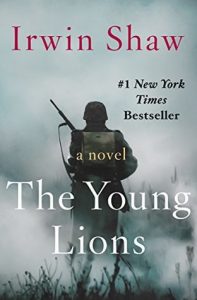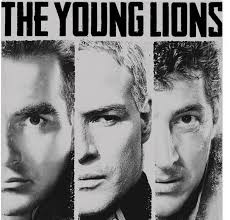What I’m Reading: “The Young Lions” by Irwin Shaw

The Young Lions (1949) by Irwin Shaw is one of those books that I’ve “known about” for a very long time, but never quite gotten around to reading. So when a tattered paperback copy (“slightly abridged” according to the legend) arrived in the house a few weeks back, I decided it was time to take the plunge, particularly as The Young Lions is regarded as one of the defining novels dealing with World War 2.
The story follows three soldiers from immediately before the war to its end. Christian, formerly a ski instructor, is a sergeant in the German army, although he’s actually Austrian. Michael and Noah are American, the former older (but still in his twenties) and working in show business at the beginning of the war; the latter, the son of an immigrant Russian Jew, is employed in New York as a “playground director.”
Although predominantly about the war, the early sections of the book establish Michael and Noah in the wider context of their civilian lives: Noah newly married to Hope, who is expecting their first child when he’s conscripted; Michael divorced from a Hollywood starlet and with a succession of girlfriends. One of these, Margaret, has met Christian in Austria in 1938—this is by way of a ‘prologue’ to the rest of the book although it’s not presented in those terms.
Overall, I found The Young Lions a worthwhile read, although initially I struggled to get into it. I think this may be because none of the three main characters is particularly likeable. Noah is the most appealing of the three, but so diffident and un-get-at-able that he’s difficult to like as a character. There is, of course, reason for this. One of the themes in the book, with respect to Noah, is that of anti-semitism in US society and in the military, and how that plays a major part in shaping his experience and character, particularly early on in the war.
Having said that, the friendships that Noah does make are exceptional—and coming to understand that, among much else, is what the journey of the book is really all about, to my mind. It’s not about liking the characters, and certainly not about cheering them on, or cheering for them. It’s about understanding Christian, Michael, and Noah, and the way the war shapes and erodes them—and also those about them, more often than not for the worse. In this sense, The Young Lions is not a “read” or simply a “story”, but an experience—and with too much in it for a blog post to cover, except for some very ‘big ticket’ items.
I’ve heard it said that a title should ‘frame’ a book and act in some way as a key to its contents. If so, then in this case the ‘key’ is either deliberately misleading or profoundly ironic. To me a title like “The Young Lions” points to the idea of soldiers as heroes, or at least as valiant warriors, and war as an heroic business. This is the exact opposite of the book. None of the three main characters are heroic, although Noah probably comes closest, displaying presence of mind, resilience, and resourcefulness under fire. But he, like the others, is shaped by war’s juggernauts of brutality and violence, and the veteran soldier’s priority of survival. And the war is far from an heroic enterprise.
The Young Lions is a war novel in the tradition of The Red Badge of Courage, For Whom the Bell Tolls, and Catch 22. Rather than heroism and daring, chivalry and honor, it is about savagery and survival and betrayal, rations and constipation, banality, confusion, and anarchy. Amid all of this, there are instances of military resolve, among which Christian’s rearguard destruction of a bridge in Italy, and Noah’s D-Day conduct (for which he is awarded a silver star) stand out. Christian’s original commanding officer, Lieutenant Hardenburg, also exemplifies a relentless personal and military courage. Michael may be also said to find his own courage, albeit in a confused and desperate way, in the final confrontation of the book.

The film poster…
I believe, though, that there is at least one “hero” in the book, although not in any Marvel movie sense of the concept. Lieutenant—later, Captain—Green is a quiet, unassuming, and underrated man, who quietly does his competent best under fire and sometimes in extraordinary circumstances. In terms of the structure of the book, he is the counterweight to Lieutenant Hardenburg, who dominates much of the earlier action. Tellingly, Hardenburg ends committing suicide, while Green deals with ensuring his men survive, and restoring order and the values of life and decency when dealing with a liberated concentration camp at the end of the war.
The importance of this is encapsulated by Noah’s statement in the final passages of the novel, that: “When the war is over…Green is going to run the world…The human beings are going to be running the world! … There’s a lot of Captain Greens! He’s not extraordinary!”
“He’s not extraordinary” is of course the ‘key’ phrase for Captain Green, when in fact the rest of the book suggests that he may, in fact, be exactly that…I also felt a sadness in reading Noah’s statement of faith, i.e. that human beings would be running the world, with so much of what we’ve seen in recent years suggesting a winding back of that conviction. Including in the United States—although that, too, is predicted in the book, through the viewpoint of a Colonel Pavone.
I think, though, that one of the touchstones moments of the book, comes in an exchange between Captain Green and Michael, on the latter rejoining his unit late in the war.
Green peered sharply at him. “What kind of soldier have you turned out to be, Whitacre?” he asked.
Michael thought for a moment. “Miserable, Sir,” he said.
Green smiled palely … “I’ll keep that in mind,” he said.
That “Miserable, Sir” encapsulated the banality, confusion, and topsy-turviness of so much of The Young Lions, but also the tenacity of endurance and survival. I also believe it speaks to the way Michael has stayed grounded, and like Green himself, retained his humanity, compassion, and sense of perspective.
Although The Young Lions took me some time to get into, I found it interesting and insightful throughout, and ended with a sense of appreciation and reading satisfaction. I would recommend it to anyone interested in “big books” that deal with the the complexity of war and its effects on human beings, as well as in an ordinary soldier’s and “every man’s” experience of World War 2.







